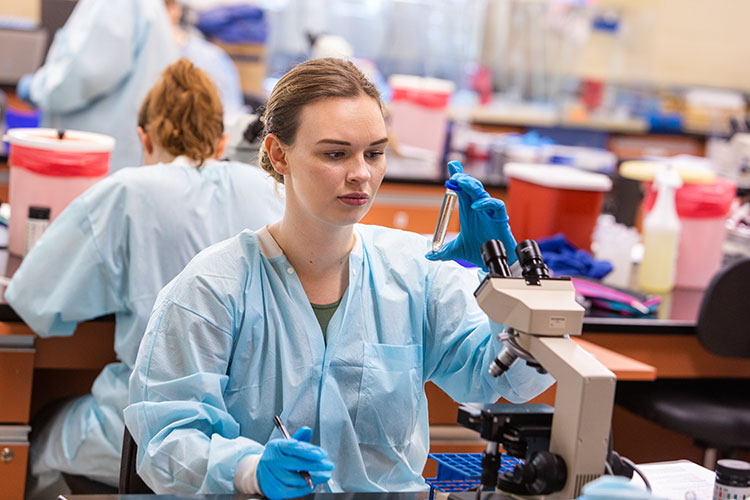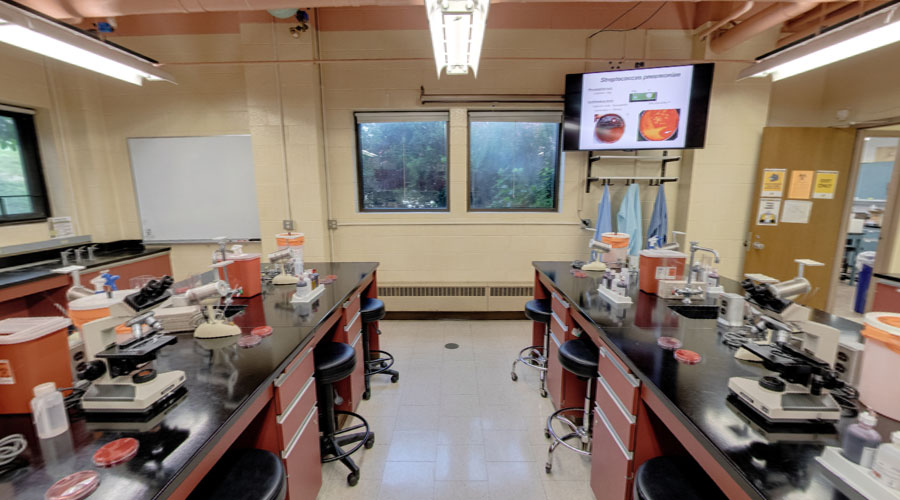Biomedical Sciences MS
The MS Biomedical Sciences program provides an advanced level of training for biomedical scientists, with emphasis on developing an understanding of the mechanisms of human disease and providing broad-based training in biomedical laboratory research.
Program Type
Master’s
Program Format
On Campus
Gain Experience
The MS Biomedical Sciences program offers a diverse array of classes and research opportunities. As a student in this program, you will gain experience in selected areas of emphasis, such as immunology, the pathogenesis of infectious diseases, toxicology, pharmacology, neurodegeneration and cancer biology.

The Biomedical Sciences Department offers a program of graduate education providing an advanced level of study for students interested in biology as it relates to human health, medicine and disease.
- Major emphasis in the program is placed on developing an understanding of the mechanisms involved in human diseases and providing broad-based training in both basic and applied biomedical sciences.
- The MS degree has two tracks. You may apply for entry into our research-based Thesis Track or our coursework-based Non-Thesis Track to best fit your career goals.
- The Thesis Track requirements include a thesis based on hypothesis-driven research conducted by the student to enhance problem-solving abilities and the student’s capacity to function more effectively in the biomedical field.
- The Non-Thesis Track is designed for students who want to gain knowledge in the biomedical sciences by taking courses focused on human health and disease without a research component. This track may be suitable for a variety of students, including those who currently work in a laboratory setting and wish to obtain a higher degree and those requiring a degree beyond the bachelor’s level to teach.
- You will work with distinguished faculty, all of whom hold their PhDs, come from diverse research backgrounds, actively engage in research and perform active service activities.
Successful Alumni
The School of Biomedical Sciences & Health Care Administration has many successful alumni. These alumni have taken their degrees and have excelled in their careers.
Visit our Alumni page and be inspired by where a health sciences degree can take you.
An applicant must meet Graduate School requirements plus the following requirements to be considered for admission:
1. The program primarily enrolls individuals with backgrounds in biomedical sciences or related fields who have completed a bachelor’s degree at an accredited institution. For students entering without a degree in a related area, the faculty determines deficiencies to be overcome prior to admission. Applications will not be reviewed until all required materials are obtained by the program. All completed applications received prior to Feb. 1 will receive consideration for enrollment beginning the following summer term for the Non-Thesis Track or fall semester for the Thesis Track. Completed applications received after Feb. 1 may be considered if space is available in the program. Students may enroll on a full-time or a part-time basis.
2. Applicants may be admitted to regular status if their grade point average is the equivalent of 2.75 or above (scale of 4.0). Averages below 2.75 may be considered for admission on a probationary basis, in which case particular attention is given to the last 60 hours completed in the undergraduate program, with special emphasis on performance in biomedical science-related courses. Probationary status is removed after successful completion of the first eight graduate credits with a grade point average of 3.0 or above.
3. Graduate Record Examination scores on the General Test are required.
4. Three letters of reference, preferably from academic and/or research sources or supervisors, must be provided.
5. The applicant must provide a statement of not more than 1,000 words providing career objectives and reasons for seeking a degree in the UWM Biomedical Sciences Graduate program.
6. Students must identify, at the time of applying, whether they seek enrollment in the Thesis Track or Non-Thesis Track. Students wishing to change tracks after admission must receive approval of the program.
The minimum degree requirement is 32 graduate credits.
Thesis Track
Fifteen (15) core curricular credits and a minimum of eight credits in research (BMS 799) must be taken. Substitutions to these courses require approval of the program.
| Code | Title | Credits |
| BMS 710 | Seminar in Biomedical Sciences (1 credit per semester; 3 credits total) | 3 |
| BMS 717 | Laboratory Technology-Theory and Practice 2 | 2 |
| BMS 718 | Experimental Design and Research in Biomedical Sciences | 1 |
| BMS 750 or BMS 751 | Infection and Immunity or Immunopathology | 3 |
| Choose one of the following: | 3 | |
| BMS 705 | Molecular Pathology | |
| BMS 756 | Current Concepts in Cancer | |
| BMS 765 | Molecular Pathophysiology | |
| Choose one of the following: | 3 | |
| PSYCH 510G | Advanced Psychological Statistics | |
| KIN 702 | Statistical Analysis in the Health Sciences | |
| PH 702 | Introduction to Biostatistics | |
| PH 712 | Probability and Statistical Inference | |
| and | ||
| BMS 799 | Research in Biomedical Sciences | 8 |
| Total Credits | 23 |
Course List
The remaining none credits required for the degree are electives, of which at least six must be taken for graduate credit from within the BMS Program. Program approval is required for BMS 590 credits to be applied toward the degree. BMS 599: Independent Study does not count toward completion of the degree. No more than three credits of BMS 999: Advanced Independent Study will be counted for the Thesis Track.
Non-Thesis Track
Eleven (11) core curricular credits, as well as two credits for the capstone project, must be taken. Substitutions to these courses require approval of the program.
| BMS 710 | Seminar in Biomedical Sciences (1 credit per semester; 2 credits total) | 2 |
| BMS 750 or BMS 751 | Infection and Immunity or Immunopathology | 3 |
| Choose one of the following: | 3 | |
| BMS 705 | Molecular Pathology | |
| BMS 756 | Current Concepts in Cancer | |
| BMS 765 | Molecular Pathophysiology | |
| BMS 610G or or BMS 615G | Pharmacology or Cellular and Molecular Toxicology | 3 |
| BMS 890 | Capstone Project | 2 |
| Total Credits | 13 |
Course List
Of the remaining 19 credits required for the degree, a minimum of 10 credits (excluding BMS 999) must be taken for graduate credit within the BMS program. Up to nine credits may be taken as elective courses at the graduate level. These elective courses may be within the BMS program or outside of the program. BMS 999 will not be counted toward the Non-Thesis Track without approval from the program.
- Head of School, School of Biomedical Sciences & Health Care Administration
- Associate Dean for Academic Affairs
- Associate Professor, Biomedical Sciences
- dollj@uwm.edu
- 414-229-4840
- Enderis Hall 899
- Assistant Professor, Biomedical Sciences
- liedhegn@uwm.edu
- 414-229-5028
- Enderis Hall 439
- Associate Professor, Chair, Biomedical Sciences Department, (Biomedical Sciences and Diagnostic Medical Imaging Programs)
- nardelld@uwm.edu
- 414-251-9074
- Enderis Hall 493
- Associate Professor, Biomedical Sciences
- skwor@uwm.edu or bms-grad@uwm.edu
- 414-251-7457
- Enderis Hall 457
- Laboratory Manager, Biomedical Sciences
- Biomedical Sciences Graduate Program Coordinator
- mmriter@uwm.edu
- 414-251-9031
- Enderis Hall B48







